Key takeaways:
- Utilize the SMART framework in setting clear, specific, and actionable goals to ensure progress.
- Break larger goals into smaller tasks to maintain motivation and celebrate small victories.
- Incorporate accountability through sharing goals with others and tracking progress regularly.
- Embrace flexibility in adjusting goals based on experiences and feedback, fostering continuous growth.
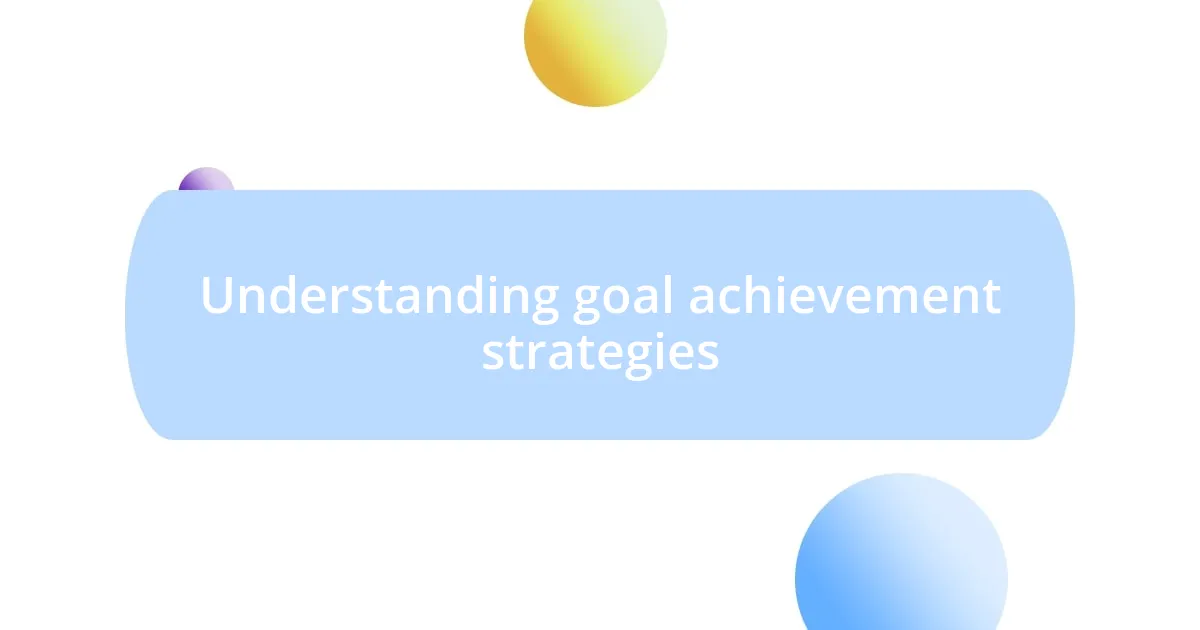
Understanding goal achievement strategies
When I reflect on my own journey towards achieving goals, I often realize that having a clear strategy can make all the difference. I remember a time when I struggled to find direction, bouncing from one task to another without a defined path. It was only when I embraced methodologies like SMART goals—Specific, Measurable, Achievable, Relevant, Time-bound—that I began to see tangible progress. Have you ever felt stuck in a cycle of wanting but not knowing how to get there?
One strategy that has really resonated with me is breaking larger goals into smaller, manageable tasks—almost like creating stepping stones across a river. I once set a big goal to improve my fitness, which felt overwhelming at first. However, by setting smaller weekly targets—like running for just 10 minutes a day—I became more motivated and engaged. Doesn’t it feel amazing when you can celebrate small victories along the way?
Another pivotal insight I’ve gained is the importance of accountability. I started sharing my goals with a friend, and the mutual support turned my solitary journey into a collaborative adventure. Whenever I felt tempted to give up, a simple check-in with them reignited my motivation. Isn’t it fascinating how having someone else in your corner can amplify your efforts to achieve your dreams?
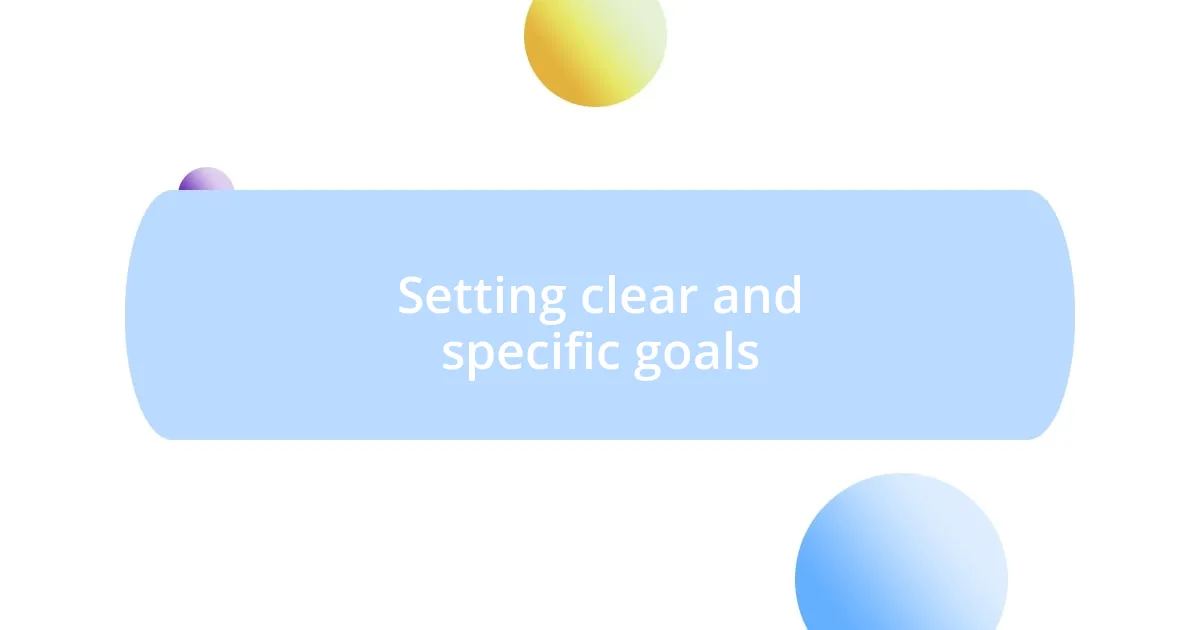
Setting clear and specific goals
When I set clear and specific goals, I feel a sense of purpose that guides my daily actions. For instance, rather than just saying, “I want to read more books,” I committed to reading one book a month by choosing topics that truly interest me. This specificity not only made my goal tangible but also turned each reading session into an exciting discovery, enriching my knowledge. There’s something incredibly empowering about knowing exactly what you’re aiming for.
Here are some key points that help me in this process:
- Be Specific: Define what success looks like. Instead of “get fit,” aim for “jog three times a week for 30 minutes.”
- Write It Down: Jotting goals down makes them real and accountability sets in.
- Visualize Your Goals: Create a vision board or put reminders in places you frequent. Seeing your goal can spark motivation.
- Set Deadlines: Having a time frame makes it easier to stay on track and creates a sense of urgency.
- Regularly Review and Adjust: I find myself revisiting my goals monthly; it’s a chance to recalibrate if something isn’t working.
This method not only enhances focus but transforms the way I relate to my ambitions. It’s like having a compass that ensures I’m navigating toward my destination smoothly.
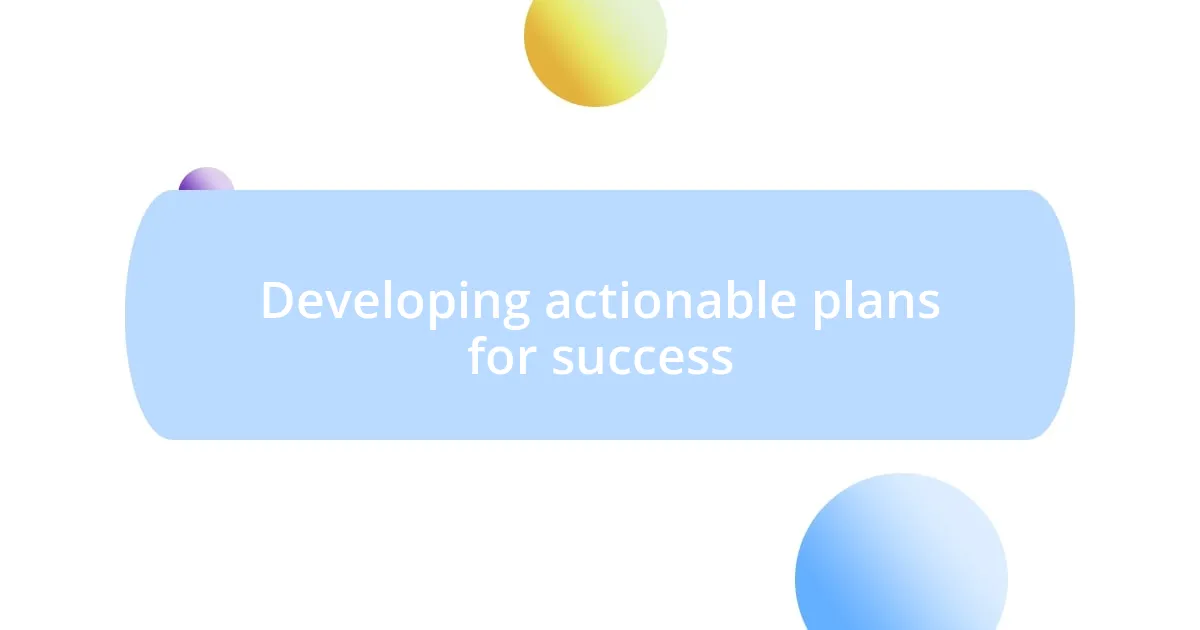
Developing actionable plans for success
Developing actionable plans is crucial for achieving success. I’ve learned that a well-structured plan acts like a roadmap, guiding me through the fog of uncertainty. For example, during a particularly busy period in my life, I had a goal of launching a side project. I broke it down into phases: research, development, and marketing. This made what seemed daunting become a series of achievable steps, which kept my motivation high. Don’t you feel more accomplished when you can tick off tasks from a list?
One technique that has truly helped me create actionable plans is using deadlines. I remember when I wanted to complete a professional certification. By setting a specific date for my final exam, I was forced to chart my study sessions—this urgency transformed procrastination into progress. Revisiting my schedule regularly and adjusting tasks as needed helped maintain my momentum. How do you track your deadlines?
Lastly, I find that incorporating feedback loops into my plans can be a game-changer. After I launched my side project, I actively sought input from users and peers, enabling me to make adjustments quickly. It felt invigorating to know I wasn’t alone in this journey, gaining insights that significantly shaped the next steps. What feedback systems do you use in your pursuits?
| Component | Description |
|---|---|
| Clear Deadlines | A specific timeline to keep you accountable. |
| Task Lists | Breaking down goals into smaller, manageable tasks. |
| Feedback Loops | Seeking opinions to adapt and improve your plan. |
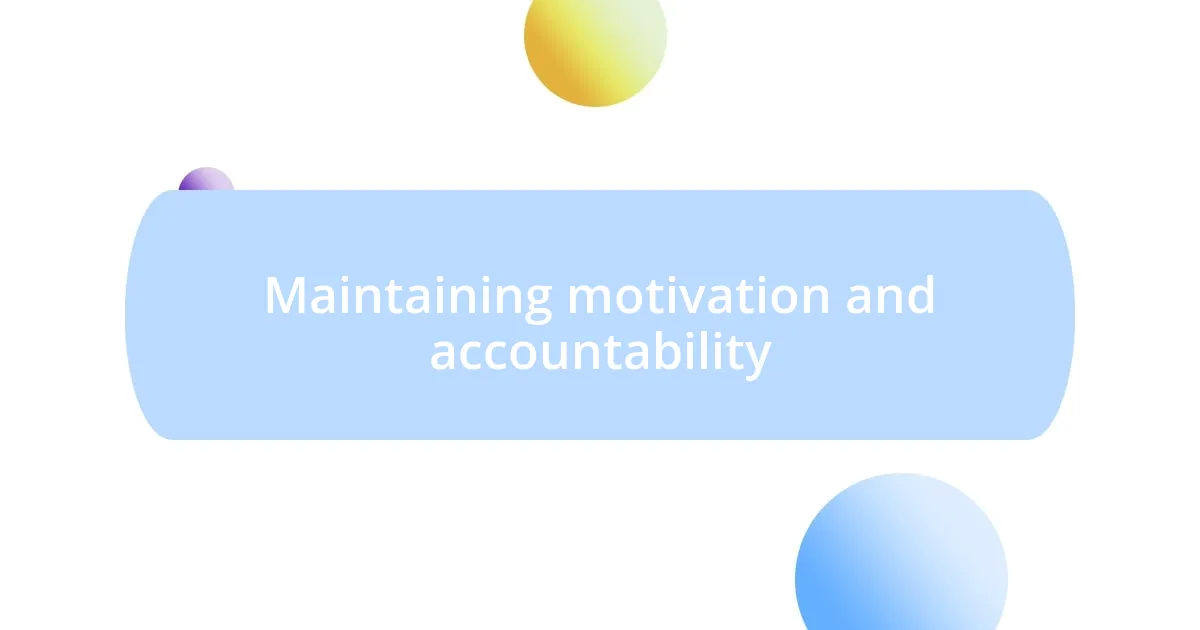
Maintaining motivation and accountability
Maintaining motivation and accountability can be a balancing act, but I’ve discovered a few strategies that keep the flame alive. For instance, I joined a local running group when I aimed to improve my fitness. The camaraderie pushed me to show up even when I’d rather have stayed in bed. It’s amazing how a supportive community can create a layer of accountability. Have you ever felt that extra nudge when part of a group?
Tracking my progress visually also works wonders for me. I love using a habit tracker on my phone to mark off my daily achievements. Every time I check off a box, I can feel a boost of motivation. I think of it like that little high-five to myself. Isn’t it satisfying to witness your progress in a tangible way, especially when the journey feels long?
Another technique I employ is sharing my goals with friends and family. When I told my best friend about my goal to read more books, she asked me every week how I was doing. This gentle form of pressure helped me stay dedicated. Plus, our discussions about each book added an extra layer of enjoyment. How do you incorporate accountability in your life?
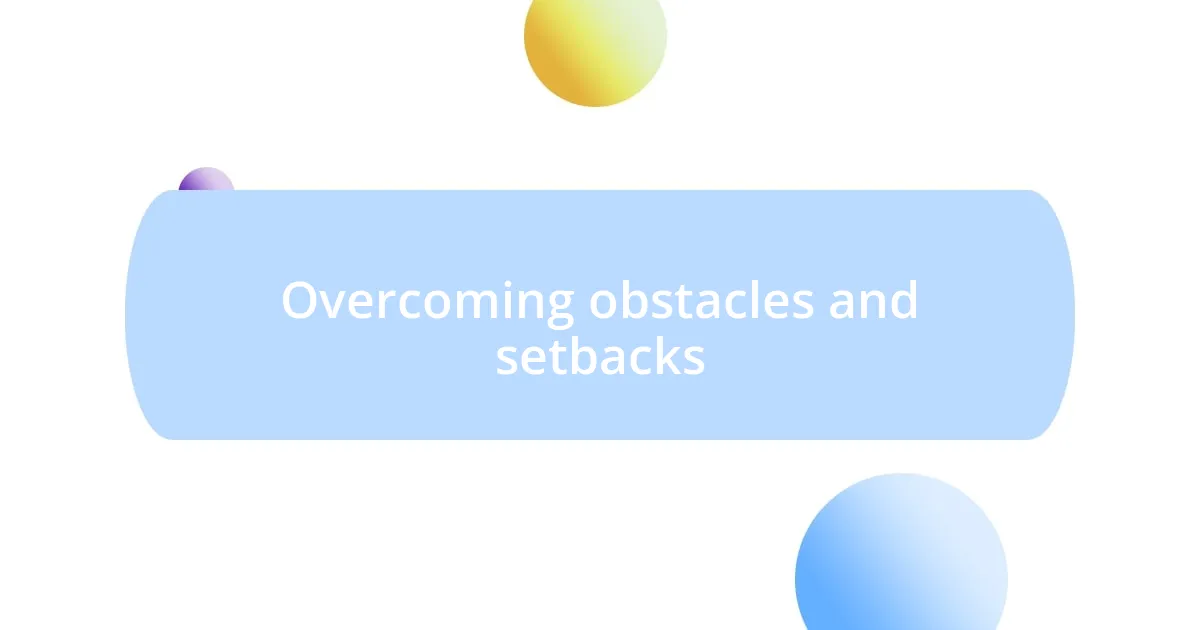
Overcoming obstacles and setbacks
Sometimes, obstacles can feel insurmountable, and I’ve certainly faced my fair share. I remember a time when a major project at work hit a roadblock because of unforeseen circumstances. Instead of letting frustration take over, I took a step back to reevaluate my approach. This moment of reflection not only helped me identify alternative solutions but also reminded me that setbacks often come with valuable lessons. Have you ever found clarity in the chaos of an unexpected challenge?
Staying flexible during tough times has been essential for me. When things didn’t go as planned in my side project, I learned to pivot rather than dwell on what went wrong. For instance, I had to adjust my marketing strategy after my initial ideas didn’t resonate. This adaptability not only salvaged my project but also reignited my passion for it. Isn’t it empowering to know that with a little creativity, you can turn setbacks into stepping stones?
Facing setbacks also taught me the importance of self-compassion. It’s easy to beat ourselves up when things don’t go perfectly, but I’ve realized that it’s more productive to acknowledge my feelings and allow myself to feel disappointed. After missing a significant deadline, I took a day to regroup, allowing myself the grace to process my emotions. This helped me bounce back stronger and more focused. How do you practice kindness towards yourself during your challenging times?
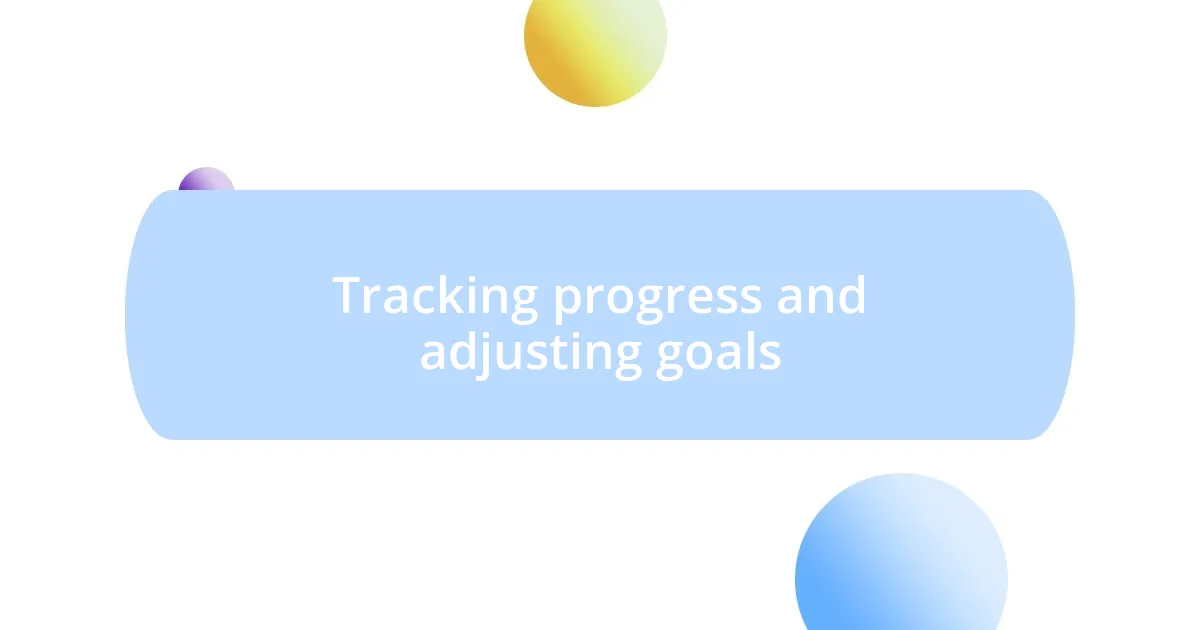
Tracking progress and adjusting goals
Tracking progress is key to ensuring I’m on the right path toward achieving my goals. I often find myself checking in weekly to assess what’s working and what isn’t. For example, when I was focusing on improving my writing skills, I would review my articles and evaluate feedback from peers. This reflection made it clear which aspects I needed to work on.
Adjusting my goals is something I’ve become comfortable with over time. I recall a particular period when I aimed to learn a new language with a strict timeline in mind. After a couple of months, it became apparent that my progress was slower than I’d hoped. Instead of feeling disheartened, I shifted my goal to a more manageable timeline that allowed for deeper learning. Isn’t it liberating to modify your goals rather than sticking rigidly to them?
Embracing change in my goal-setting has transformed the journey into something much more enjoyable. I used to doggedly pursue my original targets, but now I appreciate the flexibility of adjusting them as I learn about myself. It’s like weathering a storm—sometimes you have to redirect your sails to reach your destination. Have you ever adjusted your goals based on what you’ve learned about yourself during the journey?
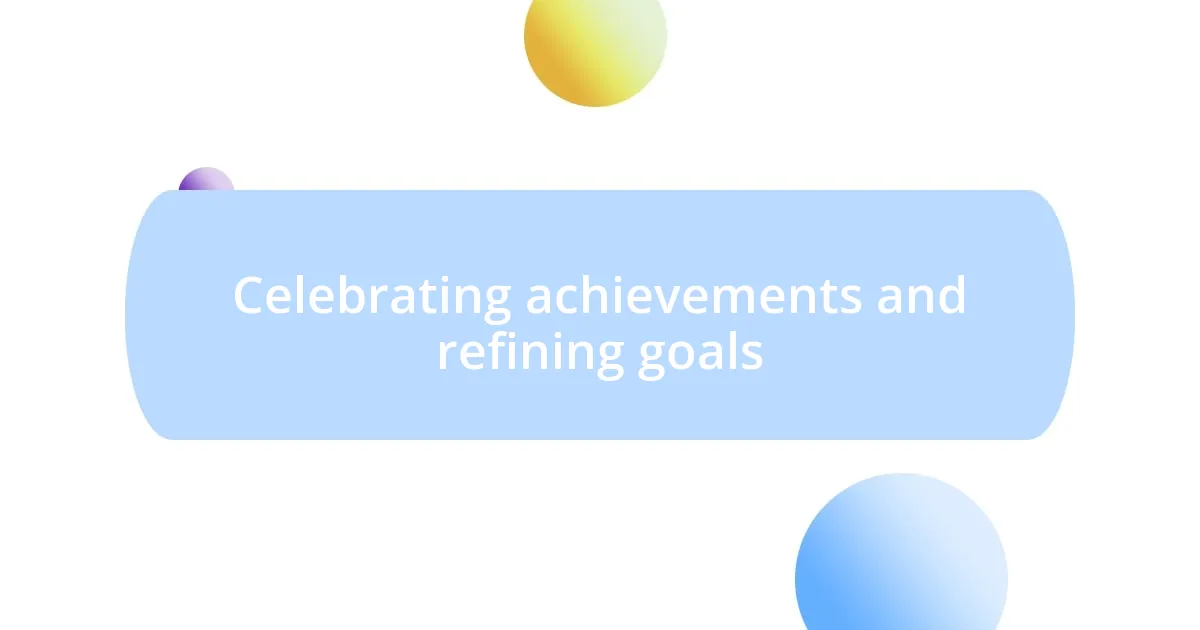
Celebrating achievements and refining goals
Celebrating achievements is a powerful ritual I’ve embraced in my life. After completing a major project, I make it a point to treat myself—be it a small indulgence or a fun outing with friends. This not only reinforces the joy of accomplishment but also serves as a reminder that every effort counts, no matter how small. Have you taken the time to acknowledge your own milestones, big or small?
Refining my goals is just as crucial as celebrating them. I find that the more I learn about myself through the process, the clearer my aspirations become. For instance, when I completed a marathon, I realized my passion lay not just in running but in the sense of community it fostered. So, I shifted my focus to organizing running events, blending my love for fitness with a desire to support others. Isn’t it fascinating how our experiences can reshape our ambitions?
I’ve noticed that this cycle of celebration and refinement fosters a positive feedback loop. Each time I celebrate, I feel more motivated to set new goals, and then I evaluate them through the lens of my achievements. It’s a dynamic dance where I grow and evolve continually. How do you keep your goals fresh and aligned with your experiences? Reflecting on this keeps me excited about what lies ahead.














